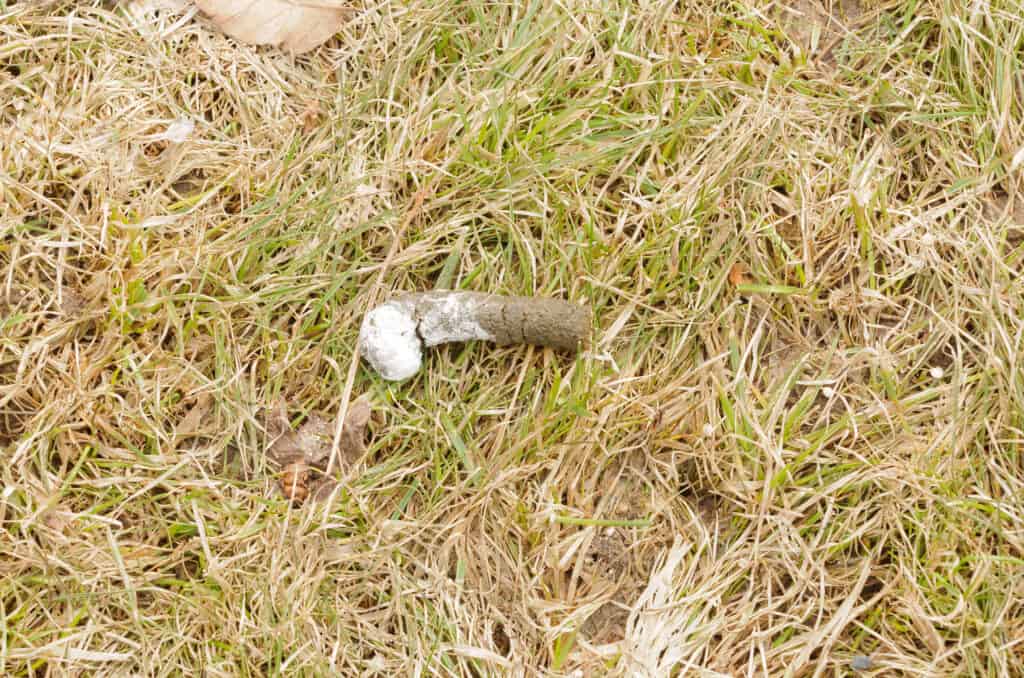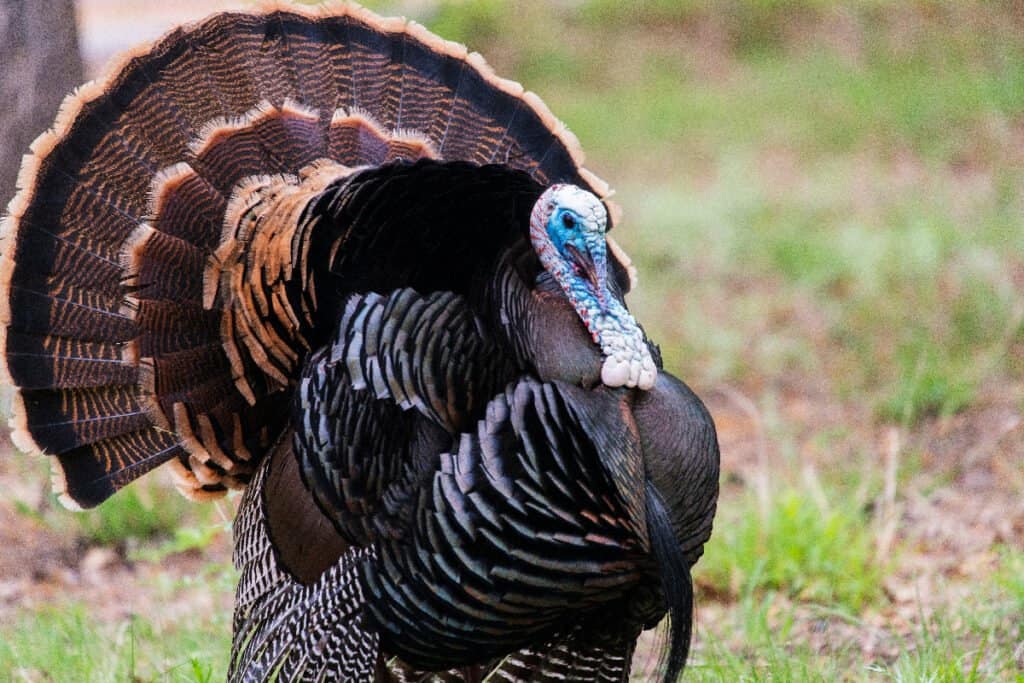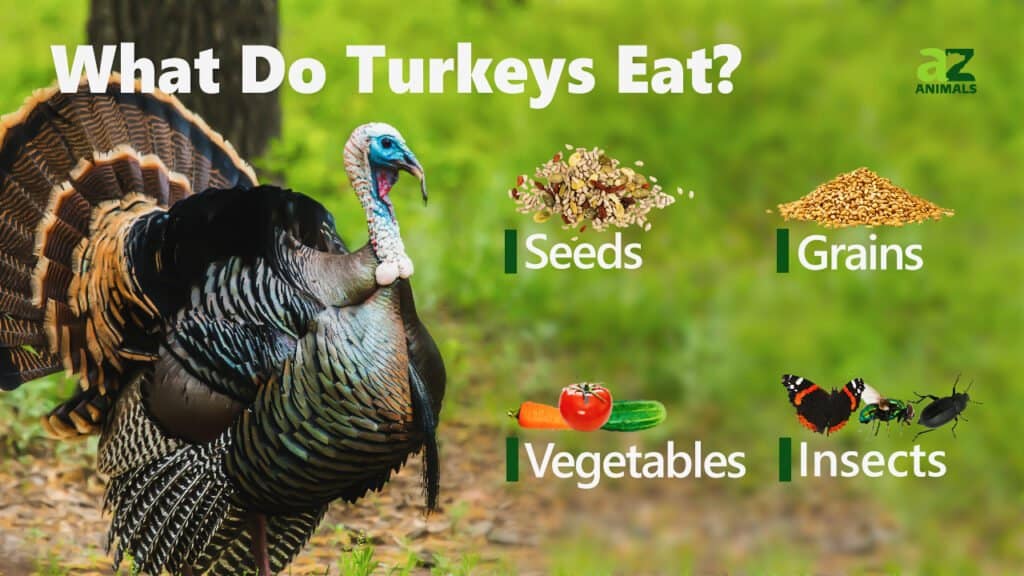Turkeys are very interesting birds that have long been domesticated and reared for their meat. But there is more to this animal than its delicious flesh; its poop. You can find out certain information about a turkey from its poop. For instance, the size, shape, and smell of the poop reveal facts about this bird. And what are these facts?
Read on to discover everything you need to know about a turkey’s poop.
What Does a Turkey Poop Look Like?

J-shaped poops are usually passed by the male turkeys.
©Jeffrey B. Banke/Shutterstock.com
If you’ve been to a poultry house filled with turkeys, you may have found coiled or J-shaped poops there. That’s what turkey poop looks like. Yes, these birds have two different poop shapes, but it all varies based on the sex of the bird.
For instance, J-shaped poops are usually passed by the males. The male turkey excreta is long, narrow, and only curls towards one end with some white uric acid on the surface of the curled end. The poop’s length is about 2.93 inches long and 0.39 inches in diameter.
On the other hand, the female excreta is quite different as it tends to swirl into a coil. Compared to that of the male poop, the female excreta is clumpier and rounder. It usually has a diameter of 0.196 inches to 0.39 inches and has uric acid splotched on its surface.
You may be wondering why there’s a difference in poop shape even though they are the same bird. Actually, the difference in shape can be attributed to the turkey’s cloaca (an orifice used for reproduction and waste removal). The female’s cloaca passes out eggs. Because of this, it is usually large and stretchy. As a result, females pass out a round, clumpier, and curly poop.
In contrast, the male’s cloaca is different since it doesn’t pass out eggs and has a rudimentary phallus (used for reproduction) located towards the end of its cloaca. Hence, the male turkey’s cloaca is narrow and smaller, thereby giving its poop a J shape.
Knowing the difference in poop shape of the two sexes has its perks. By observing the shape of the bird’s poop, you can easily identify the sex of a turkey.
What Constitutes Turkey Poop?
Turkey poop is often greenish-brown in color, and it is made up of feces and urine (in the form of uric acid). Turkeys pass out uric as opposed to urea in mammals and most animals. Unlike urea, uric acid is safer for the turkey embryo.
Embryos are surrounded by fluids which supply the nutrients they need to grow. If these embryos were to pass out urea as waste, the urea would react with the fluids there by creating a toxic environment for them. This will end up killing the embryo.
In contrast, uric acid can crystallize and turn into stone when passed out. Unlike urea, these stones can stay within the eggs without dissolving into the surrounding fluids and poisoning the embryo.
Is Turkey Poop Harmful?

Humans can get diseases from turkey poop.
©Brent Coulter/Shutterstock.com
Turkey poop contains microorganisms. While these microorganisms might not be harmful to the bird itself, they are to humans – they can cause human afflicting diseases. Therefore, it is necessary to avoid direct contact with turkey poop.
Additionally, turkey poop can be poisonous to dogs. For instance, when dogs ingest them, they can get a fungal infection known as histoplasmosis. Some symptoms of histoplasmosis in dogs include loss of appetite and weight loss.
Also, turkey poop is known for hosting chlamydia psittaci. Dogs can also get this lethal bacteria through ingestion. Some symptoms of chlamydia psittaci infection in dogs include muscle pain and swollen red eyes with a green or yellow discharge. Unfortunately, in severe cases, infected dogs can die.
Therefore, it is necessary that dogs be kept away from turkeys’ poop as it can be poisonous to them.
Is Turkey Poop Useful?
It’s an incredible fact about turkeys that their poop is very useful. For instance, turkey poop is a good source of manure. As manure, they are inexpensive and can be easily sourced from a poultry farm. And most importantly, they contain necessary soil nutrients like nitrogen, phosphorus, and potassium.
Also, they can be processed into an energy source. Turkey’s excrement, when treated, can be turned into combustible fuel, which can then be used to power a plant. According to the research by a team of scientists at Ben-Gurion University in Israel, they found out that this waste fuel has the potential to replace up to 10 percent of the coal used in electricity generation. The advantage of this is that it could reduce greenhouse gas emissions, making it an environmentally friendly fuel.
What Do Turkeys Eat?

Turkeys are omnivores, which means that they can eat both plant-based foods like seeds, grain, nuts, and animal-based diets like fish, insects, snails, mealworms, and lizards. Turkeys are also warm-blooded, which means that they derive energy to generate body heat from food. This factor influences the type of food they eat.
The photo featured at the top of this post is © Tom Reichner/Shutterstock.com
Thank you for reading! Have some feedback for us? Contact the AZ Animals editorial team.






